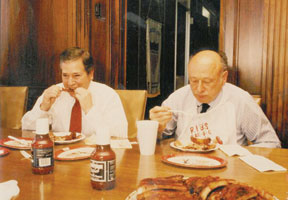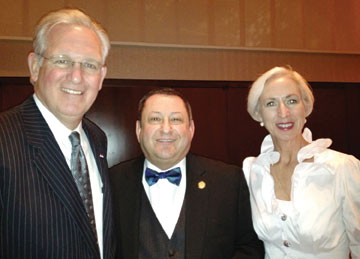Jewish girl sues state of Kansas over C02 emissions
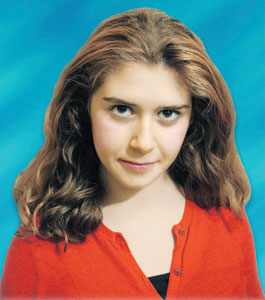 For 15-year-old Samantha Farb, caring for the environment is not just a personal conviction, it’s a public issue.
For 15-year-old Samantha Farb, caring for the environment is not just a personal conviction, it’s a public issue.
The Lecompton, Kan., resident sued Gov. Brownback’s administration, alleging that the state violates the public trust doctrine because it does not regulate C02 emissions. These emissions are considered by many scientists to be a chief cause of global warming.
“We are suing Gov. Brownback because we think it is his responsibility to take care of the resources,” Samantha said.
Samantha is a freshman at Freestate High School in Lawrence. She is the daughter of Joe and JoAnn Farb and the granddaughter of Bernie and Judy Fremerman and the late Jack and Shirley Farb.
“I would really like to not only win but to create a huge awareness about our environment,” Samantha said.
She said environmental consciousness has always been a part of her life and a part of her faith.
“My family has always raised me to think about how can we help other people,” Samantha said.
Topeka attorney Robert Eye filed the lawsuit on behalf of Samantha in October in Shawnee County District Court.
The lawsuit is one of several filed throughout the country as part of a grassroots effort led by the non-profit Our Children’s Trust.
Julia Olson, executive director of Our Children’s Trust, said the initiative teaches youth who are passionate about the environment how to become activists for their cause.
“These kids are passionate climate activist. They really care about what is happening in the atmosphere,” Olson said. “We are trying to get their voice heard.”
Olson said there are currently 10 active lawsuits throughout the country filed by Our Children’s Trust participants.
The state’s attorney Steve Fabert filed a motion to dismiss the case.
Eye said he hopes that the judge allows for oral arguments before making a decision on whether the case should be dismissed.
“This really is about doing unto others about what we would have them do to us,” Eye said. “We have an obligation to future generations to leave the Earth certainly as good as we found it.”
Eye said the basis of Samantha’s lawsuit is that the air belongs to the public and based on the public trust doctrine the government has an obligation to protect that public resource.
Courts have used the public trust doctrine to protect water resources, Eye said.
“It has never been applied to protecting atmospheric resources,” Eye said. “If water can be protected by the public trust doctrine it is hard to see that the atmosphere wouldn’t be treated the same.”
If the Shawnee District Court judge rules that the atmosphere is part of the public trust the judge can also require the state to take action to protect the atmosphere.
Samantha said she hopes the judge rules for such action.
In the meantime, Samantha encourages everyone to take steps to reduce their carbon footprints.
“There are lots of things you can do,” Samantha said.
Samantha’s recommendations include eating a plant based diet, using less fossil fuel, and recycling as ways everyone can reduce their carbon footprint.



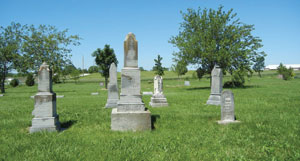 The B’nai Israel Cemetery in Eudora, Kan., owned and maintained by the Lawrence Jewish Community Congregation, has been placed on the National Register of Historic Places. The congregation learned of the designation last month.
The B’nai Israel Cemetery in Eudora, Kan., owned and maintained by the Lawrence Jewish Community Congregation, has been placed on the National Register of Historic Places. The congregation learned of the designation last month. Rabbi Yitzchak Feigenbaum’s resume reads like a Who’s Who of Jewish institutions: first mashgiach and educational director of Aish HaTorah, founder of Darchei Noam/Shapell College of Jewish Studies, author of “Understanding the Talmud.” On top of all that, the Israeli Foreign Ministry sent the rabbi and his wife to the former Soviet Union for a very dangerous mission in the 1970s — to organize clandestine classes in Hebrew and Judaism for refuseniks.
Rabbi Yitzchak Feigenbaum’s resume reads like a Who’s Who of Jewish institutions: first mashgiach and educational director of Aish HaTorah, founder of Darchei Noam/Shapell College of Jewish Studies, author of “Understanding the Talmud.” On top of all that, the Israeli Foreign Ministry sent the rabbi and his wife to the former Soviet Union for a very dangerous mission in the 1970s — to organize clandestine classes in Hebrew and Judaism for refuseniks.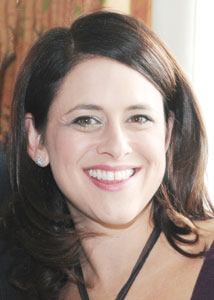 In 2010, Beth Kaplan Liss decided to take her passion for philanthropy to a national level, and was selected to join the ranks of Jewish Federations of North America’s National Young Leadership Cabinet. When Liss joined the group, she joined the ranks of 300 men and women, ages 30 to 45, all with impressive resumes and a strong desire to change the world for the better.
In 2010, Beth Kaplan Liss decided to take her passion for philanthropy to a national level, and was selected to join the ranks of Jewish Federations of North America’s National Young Leadership Cabinet. When Liss joined the group, she joined the ranks of 300 men and women, ages 30 to 45, all with impressive resumes and a strong desire to change the world for the better.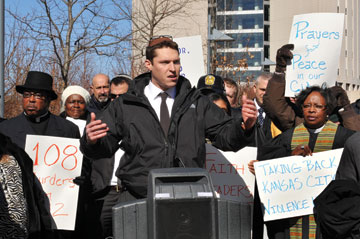 MORE2 RALLY AGAINST VIOLENCE — Two of our local rabbis, Rabbi Shmuly Yanklowitz of K.I. and Rabbi Doug Alpert of Kol Ami, took part in Monday’s rally against violence sponsored by MORE2 at Ilus Davis Park downtown. The organization planned it because “violence is killing our community.” Rav Shmuly explained that they “gathered together with the mayor as clergy of all faiths to unite against gun violence. It is crucial that Jewish leadership is at the forefront of speaking out against injustice and oppression. The Jewish tradition is unequivocal about the need to create safe societies that honor the human dignity of all people.”
MORE2 RALLY AGAINST VIOLENCE — Two of our local rabbis, Rabbi Shmuly Yanklowitz of K.I. and Rabbi Doug Alpert of Kol Ami, took part in Monday’s rally against violence sponsored by MORE2 at Ilus Davis Park downtown. The organization planned it because “violence is killing our community.” Rav Shmuly explained that they “gathered together with the mayor as clergy of all faiths to unite against gun violence. It is crucial that Jewish leadership is at the forefront of speaking out against injustice and oppression. The Jewish tradition is unequivocal about the need to create safe societies that honor the human dignity of all people.”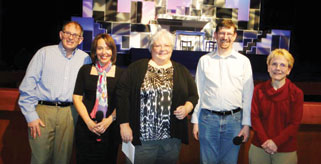
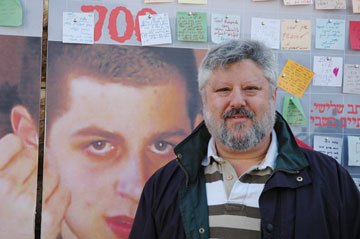 Dr. Gershon Baskin, founder and board member of the Israel Palestine Center for Research and Information, will speak at 7 p.m. Saturday, Feb. 9, in the Whitfield Center at Avila University, 11901 Wornall Road, Kansas City, Mo. His topic will be “Peace in the Midst of Conflict.”
Dr. Gershon Baskin, founder and board member of the Israel Palestine Center for Research and Information, will speak at 7 p.m. Saturday, Feb. 9, in the Whitfield Center at Avila University, 11901 Wornall Road, Kansas City, Mo. His topic will be “Peace in the Midst of Conflict.”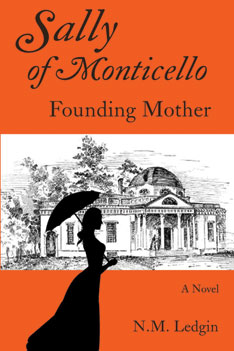 If you want to come as close as is feasibly possible to learning the truth about Thomas Jefferson and his relationship with the slave Sally Hemings, read Kansas City area author N.M. Ledgin’s book, “Sally of Monticello: Founding Mother.”
If you want to come as close as is feasibly possible to learning the truth about Thomas Jefferson and his relationship with the slave Sally Hemings, read Kansas City area author N.M. Ledgin’s book, “Sally of Monticello: Founding Mother.”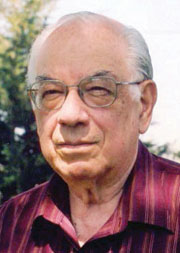 Ledgin said there is another fact that many historians overlook. Hemings was Jefferson’s wife’s half-sister, both having been fathered by the same man, John Wayles. So she was Jefferson’s sister-in-law.
Ledgin said there is another fact that many historians overlook. Hemings was Jefferson’s wife’s half-sister, both having been fathered by the same man, John Wayles. So she was Jefferson’s sister-in-law.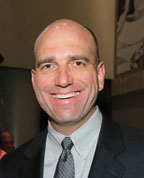 “I’m looking forward to an energetic conversation about a very dynamic moment in the nation’s history. Just when gridlock seems worst, that is the moment when breakthroughs might come,” said Time Magazine’s David Von Drehle, referring to his Feb. 13 appearance at the Jewish Community Campus.
“I’m looking forward to an energetic conversation about a very dynamic moment in the nation’s history. Just when gridlock seems worst, that is the moment when breakthroughs might come,” said Time Magazine’s David Von Drehle, referring to his Feb. 13 appearance at the Jewish Community Campus.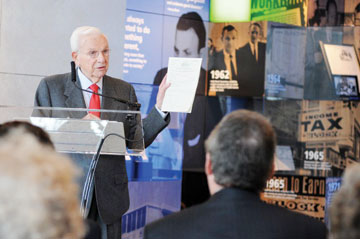 H&R Block recently unveiled a living, interactive archive to celebrate almost 60 years of tax preparation and becoming the world’s largest tax preparation company. The company also cut the ribbon at the state-of-the-art office at its world headquarters in the heart of Kansas City’s Power & Light District.
H&R Block recently unveiled a living, interactive archive to celebrate almost 60 years of tax preparation and becoming the world’s largest tax preparation company. The company also cut the ribbon at the state-of-the-art office at its world headquarters in the heart of Kansas City’s Power & Light District.